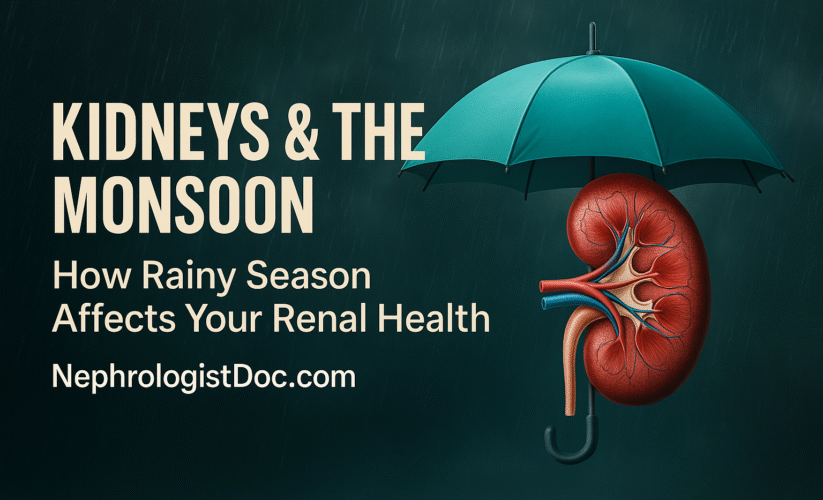Kidneys & the Monsoon: How Rainy Season Affects Your Renal Health

The monsoon season brings much-needed relief from Gurgaon’s intense summer heat. But with the cooling showers come hidden health risks—especially for those with kidney concerns. From changes in hydration patterns to the rise of infections, the rainy season can silently strain renal health. Understanding how monsoon impacts kidney function can help you stay protected and healthy.
How Monsoon Weather Can Affect Kidney Function
Many people associate monsoon with viral fevers or stomach infections, but few realize that kidney health can be directly affected. The kidneys are sensitive to fluid balance, infection risk, and dietary changes—all of which shift during this season.
During monsoon, the body often experiences inconsistent hydration due to reduced thirst. While some people stop drinking enough water, others—especially those on restricted diets—may unknowingly overhydrate. Both can pose dangers to kidney patients, particularly those with chronic kidney disease (CKD) or heart conditions. Fluid overload can cause swelling and blood pressure fluctuations, while dehydration can elevate toxin buildup in the bloodstream.
Monsoon Diet: A Hidden Danger for Kidney Patients
Rainy days tempt us with deep-fried snacks, salty pickles, and spicy street food. Unfortunately, these foods are rich in sodium and potassium—two minerals that require close monitoring in kidney patients. High salt intake can worsen blood pressure and promote water retention, increasing the burden on already weakened kidneys.
Additionally, common monsoon foods like bananas, potatoes, and leafy greens—though healthy—can elevate potassium levels and pose risks for those with advanced kidney disease.
Choosing home-cooked, balanced meals and moderating salt intake is essential for anyone managing kidney conditions during the monsoon.
Water Contamination and Infection Risks
Monsoon water is often contaminated with harmful bacteria like E. coli or leptospira, which can cause urinary tract infections (UTIs) and, in severe cases, acute kidney injury (AKI). This risk is especially high for individuals with reduced immunity or those undergoing dialysis or post-transplant care.
It’s important to ensure that drinking water is filtered or boiled. Avoid consuming raw salads, fruits washed in tap water, or any street-side juices. These preventive measures can dramatically lower infection risks during the rainy season.
Who Should Be Extra Cautious in Monsoon
Certain groups are more vulnerable to complications during the monsoon:
- Patients with CKD
- Dialysis patients
- Kidney transplant recipients
- People with uncontrolled diabetes or hypertension
- Elderly individuals with weakened immune systems
For these individuals, even minor infections or hydration imbalances can escalate into serious medical issues if not addressed early.
What You Can Do to Protect Your Kidneys This Monsoon
Prevention during the rainy season is about being vigilant and informed. Practicing proper hygiene, drinking safe water, avoiding over-the-counter painkillers, and monitoring blood pressure regularly are simple steps that can safeguard your kidneys.
It’s also wise to watch for signs like puffiness around the eyes, swelling in the feet, changes in urination, or sudden weight gain. These could indicate fluid imbalance or early signs of kidney distress and should be evaluated immediately.
Regular consultations with a kidney specialist ensure that underlying risks are identified early and managed proactively. Seasonal changes often alter the body’s response to medication and fluid retention, which is why personalized treatment and follow-ups are especially important during this time.
Why Choose Kidney Clinic, Gurgaon
At Kidney Clinic, under the guidance of a highly experienced nephrologist, patients receive tailored care that considers both their medical history and seasonal vulnerabilities. With over 16 years of experience, the clinic emphasizes ethical, evidence-based care and patient education.
From managing early-stage CKD to helping transplant patients maintain optimal health, the clinic serves as a trusted destination for kidney care in Gurgaon—especially during high-risk periods like the monsoon.
Conclusion
Monsoon may bring cool winds and fresh beginnings, but for kidney patients, it also brings unique health challenges. With simple lifestyle adjustments and the right medical support, you can continue to enjoy the season without compromising your renal health.
Book your consultation at NephrologistDoc.com and take the first step toward kidney protection this monsoon. Your kidneys deserve care—rain or shine.






